 How many individual things are we able to remember at once–without resorting to unholy trickery, that is? At any given time, the experts will tell you, we can keep between five and nine things in mind, on average. That’s another interesting piece of trivia to tuck away, but it’s actually not what I’m talking about. I mean what is the sum total of things that we can know? Is there an end to it? We must assume there is an upper limit, owing to the brain’s finite mass. And if a brain is like my attic then we must also assume that, as it reaches maximum capacity, it’s not so much the size of the object you’re trying to stuff up there, but the shape of it as well. Any new thought, in other words, would have to be able to fit in among the other notions, in form as well as size. It follows then that at some point you can only accept certain types of information, which, considering my elders, is just about as accurate a theory as any other I’ve been able to devise.
How many individual things are we able to remember at once–without resorting to unholy trickery, that is? At any given time, the experts will tell you, we can keep between five and nine things in mind, on average. That’s another interesting piece of trivia to tuck away, but it’s actually not what I’m talking about. I mean what is the sum total of things that we can know? Is there an end to it? We must assume there is an upper limit, owing to the brain’s finite mass. And if a brain is like my attic then we must also assume that, as it reaches maximum capacity, it’s not so much the size of the object you’re trying to stuff up there, but the shape of it as well. Any new thought, in other words, would have to be able to fit in among the other notions, in form as well as size. It follows then that at some point you can only accept certain types of information, which, considering my elders, is just about as accurate a theory as any other I’ve been able to devise.
Regardless, the reason this thought is occupying so much of my mind is due to a list that I can’t forget. Because I am a slothful creature by nature, I’ve always clustered tasks–those things that must get done–into as short a time as possible, the better to have done with them. As I run my internal audit, which usually happens while I’m in the shower, I string together an unwieldy list of activities that I’ll try to maintain by repeating them like a mantra. “Marinate the tempeh, add memory to the Palm, necklace for sister… Marinate the tempeh,” and so on. Invariably, when the list grows too long, errors begin to creep in. Words cannibalize themselves, and I am subject to involuntary spoonerism episodes. This must be what dementia is like.
The sheer bulk of information necessitates that I pare back to bare essentials. “Marinate, memory, necklace,” et cetera. These optimized lists are much more manageable, and sometimes they’re even catchy. But that’s the problem, see. If they’re too catchy then the lists can bridge the gap between short term memory and long term memory, and suddenly I find myself weaving these one-time lists–agendas shortly to become obsolete–into the very tapestry that makes me who I am.
Continue reading
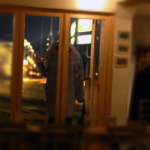 The first time we visited the progressive suburban creperie, we’d allowed ourselves just enough time to eat before the late evening movie. Nestled in the crook between the faux rusticana post-antique used junk store and the self-consciously over-exotic soap and bong shop, the restaurant was the most convenient place to grab a bite, since it was right across the street.
The first time we visited the progressive suburban creperie, we’d allowed ourselves just enough time to eat before the late evening movie. Nestled in the crook between the faux rusticana post-antique used junk store and the self-consciously over-exotic soap and bong shop, the restaurant was the most convenient place to grab a bite, since it was right across the street.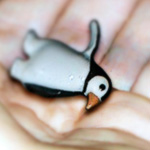 Several years ago the print shop I worked for went through one of its “employees first” episodes that typically develops in the fertile valley between layoff seasons. In an economy classified by irrational exuberance, the shop’s management were the very embodiment of giddy generosity, which I likened to a congregation of apple-cheeked uncles, fresh in from abroad, whose pockets were filled with all manner of exotic gifts for their favorite nephews. It was complimentary bagels every morning, and pizza for lunch on Fridays. Of course, during such periods of cherubic generosity a long memory would serve the employee well, in particular the understanding that a jocular manager should be treated with the same respect afforded to a freshly-fed pit viper: they’re only docile for the time being, but when that first hunger pang hits…
Several years ago the print shop I worked for went through one of its “employees first” episodes that typically develops in the fertile valley between layoff seasons. In an economy classified by irrational exuberance, the shop’s management were the very embodiment of giddy generosity, which I likened to a congregation of apple-cheeked uncles, fresh in from abroad, whose pockets were filled with all manner of exotic gifts for their favorite nephews. It was complimentary bagels every morning, and pizza for lunch on Fridays. Of course, during such periods of cherubic generosity a long memory would serve the employee well, in particular the understanding that a jocular manager should be treated with the same respect afforded to a freshly-fed pit viper: they’re only docile for the time being, but when that first hunger pang hits…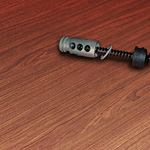 It began like everything begins: with laziness, which is the true mother of invention. Let me just say that there came a time when I was tasked with moving a small appliance from one room to another room, and by sheer coincidence I realized at that exact same time that to subject myself to said mission would literally liquify my brain. What could be less engaging, after all, than picking something up from one place and putting it back down in another place? Material transferral has got to be the most cripplingly banal task a person could ever perform.
It began like everything begins: with laziness, which is the true mother of invention. Let me just say that there came a time when I was tasked with moving a small appliance from one room to another room, and by sheer coincidence I realized at that exact same time that to subject myself to said mission would literally liquify my brain. What could be less engaging, after all, than picking something up from one place and putting it back down in another place? Material transferral has got to be the most cripplingly banal task a person could ever perform. The Physics professor takes his place at my side five minutes later than usual. If the rest of the crew at the metro stop notices Nathaniel Whippingposte’s tardiness you could never gauge it from their outward appearances. Acknowledgement would be crossing that delicate social boundary that keeps a morning commuter safe from commitment. In all honesty, I can’t be certain that the man next to me is a physics professor at all, nor even that his name is “Nathaniel Whippingposte,” because I’ve never actually spoken to him. It’s not to say that we live in a society of strangers. In fact, I call this motley collection of characters “the crew” because we’re that tight-knit. We’re the regulars. Sure, there are the travellers through, the one-time companions, the sight-seers, but the core group remains. More than that, we all tend to stand in exactly the same spots from morning to morning, scattered, and equidistant from one another. Physics professor might call that a stochastic diffusion.
The Physics professor takes his place at my side five minutes later than usual. If the rest of the crew at the metro stop notices Nathaniel Whippingposte’s tardiness you could never gauge it from their outward appearances. Acknowledgement would be crossing that delicate social boundary that keeps a morning commuter safe from commitment. In all honesty, I can’t be certain that the man next to me is a physics professor at all, nor even that his name is “Nathaniel Whippingposte,” because I’ve never actually spoken to him. It’s not to say that we live in a society of strangers. In fact, I call this motley collection of characters “the crew” because we’re that tight-knit. We’re the regulars. Sure, there are the travellers through, the one-time companions, the sight-seers, but the core group remains. More than that, we all tend to stand in exactly the same spots from morning to morning, scattered, and equidistant from one another. Physics professor might call that a stochastic diffusion. If you’ll pardon a momentary break in the narrative, the following is an account of my dream, as I remember it.
If you’ll pardon a momentary break in the narrative, the following is an account of my dream, as I remember it.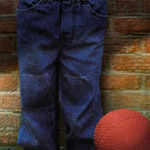 “Come on, we need a fourth man!” That’s funny. Man. We were no older than eight, and already my friends had appropriated the language of their fathers. But, much as I hated to, I was going to disappoint them on this day. There was no way I was going to run around the playground in the miasma of high-noon, not when I was wearing my Toughskins jeans. I just stared at my feet and remained against the schoolhouse wall in the shade of the eaves.
“Come on, we need a fourth man!” That’s funny. Man. We were no older than eight, and already my friends had appropriated the language of their fathers. But, much as I hated to, I was going to disappoint them on this day. There was no way I was going to run around the playground in the miasma of high-noon, not when I was wearing my Toughskins jeans. I just stared at my feet and remained against the schoolhouse wall in the shade of the eaves.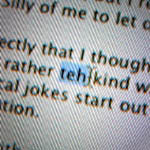 Peering over the shoulders of the brothel newsletter’s editors each day, it finally dawned on me that a person’s editing style is a component of their psychological makeup. Based on my observations–field research, if you will–I methodically codified certain basic personality traits by matching my coworkers’ various methods of typo correction to their respective psychological tendencies. Of course only a certain kind of person is drawn to publish a brothel newsletter at all. Through the years there were always those who questioned, right to my face, the legitimacy of a brothel newsletter, but to those people I posed the question: which brothels have you been soliciting? Certainly not one that has to its name three Peabody Awards for Excellence in Cathouse Media. The Receptive Feline is not your father’s brothel, and that’s all I have to say on that matter.
Peering over the shoulders of the brothel newsletter’s editors each day, it finally dawned on me that a person’s editing style is a component of their psychological makeup. Based on my observations–field research, if you will–I methodically codified certain basic personality traits by matching my coworkers’ various methods of typo correction to their respective psychological tendencies. Of course only a certain kind of person is drawn to publish a brothel newsletter at all. Through the years there were always those who questioned, right to my face, the legitimacy of a brothel newsletter, but to those people I posed the question: which brothels have you been soliciting? Certainly not one that has to its name three Peabody Awards for Excellence in Cathouse Media. The Receptive Feline is not your father’s brothel, and that’s all I have to say on that matter. Of my parents I remember precious little, and the memories I do hold are frustratingly elusive. The very act of reminiscing would seem to change my memories over time, and I find myself doubtful of details that I was once sure about. The trick, I’ve found, is to keep these memories far enough away to avoid tampering, but close enough to consciousness to keep from forgetting them completely. I take satisfaction in trusting that they’re there. That’s what I’ve told myself.
Of my parents I remember precious little, and the memories I do hold are frustratingly elusive. The very act of reminiscing would seem to change my memories over time, and I find myself doubtful of details that I was once sure about. The trick, I’ve found, is to keep these memories far enough away to avoid tampering, but close enough to consciousness to keep from forgetting them completely. I take satisfaction in trusting that they’re there. That’s what I’ve told myself.